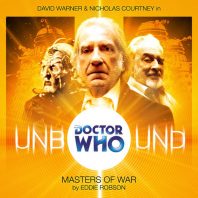
Released December 2008
Aside from Geoffrey Bayldon’s alternative First Doctor who showed what life with and without Susan both before and after finally leaving Gallifrey could have been like, no other incarnation in the original Unbound run deserved a second outing more than David Warner’s, especially once retired army officer Alistair Lethbridge-Stewart entered the TARDIS for adventures anew. With Eddie Robson’s ‘Masters of War,’ further insight into this fascinating duo is finally offered as a random trip takes the two to Skaro with the Thal city under Dalek occupation and rumblings of the Daleks’ mythical creator Davros growing years after the Doctor originally helped the Thals to defeat the Daleks.
Though the cover does explicitly give away the fact that Davros is involved, Robson is wise enough to give the Daleks and what appears to be their more munificent actions ample time to develop before their creator takes centre stage. As always, the Doctor chose not to stick around to witness the fallout after offering his assistance with the so-called Great Siege, and Daleks that existed off-world returned to Skaro to assert their control and dominance once again. However, this series is predicated on alternatives to established fact, and at least a portion of the Daleks here- while every bit as dangerous and single-minded as always- also exist with a working knowledge of remorse and pity in their actions put there by their creator. This sets up a unique portrayal of a burgeoning civil war like what played out in the latter years of the classic series run on television as the ones without pity instilled attempted to kill Davros and their leading Black Dalek still fails to realise that its control of the Daleks under its command inherently means that the Daleks are not completely uniform. With the Daleks in general thus confronted with a decision between having the Black Dalek and Davros as a figurehead, the freedom to choose adds a fascinating dynamic to this classic foe and truly helps distinguish the conflict here from anything that has come before.
There’s an intriguing mix of fear and mistrust between the Thals and Daleks given their past even after the branching of Dalek ideology and uneasy alliance is revealed, and the Thals ultimately betraying the Daleks when the Daleks refuse to give up is both surprising and yet perfectly fitting given the buildup to that fateful moment. While it would have been easy to simply write this story as another version of the Dalek civil war, however, Robson has also added in a third front in the form of the Quatch, ethereal and ruthless masters of strategy who hail from another dimension and who removed Davros from the equation when they realised the Daleks were a threat during their first incursion in order to maximise the chances of their own success. The choice of voices for this merciless new race is a bit off-putting and belies its members’ true menace to some extent by playing up a more stereotypical ethereal nature, but the time afforded to aptly build up the nuances and scale of this conflict in a well-developed manner makes for a thoroughly rewarding and engrossing experience overall that never shortchanges any event or thought.
While the Daleks are a joy to experience within the loose confines of the Unbound setting, it’s rightly the lead characters who leave the most lasting impact. David Warner confidently steps back into the role of the Doctor and instantly exudes the confidence and pride with little regard for what those around him think that was so present in his debut. He has a certain impatience and hates staying in the background when he can take action himself, growing bored of this conflict almost instantly but unable to escape it when his brilliant plan to instill the spectre of Davros within the Dalek ranks is foiled by the arrival of the genuine article, choosing throughout only to use native technology to prove his point that there are ways other than torture to obtain needed information. At the same time, Nicholas Courtney reprises his role of weary soldier effortlessly, and the energy he brings to a man who has a chance to redeem himself to some extent against the Daleks who caused his competence to come into question after too many men were lost against them on Earth so long ago is magnificent to behold. He slips into the role of authoritative figure with ease, and the thought of Lethbridge-Stewart staying behind to act as a facilitator and negotiator for the Daleks and Thals is a brilliant continuation of this man’s intended career path that was so sadly cut short in this reality.
Terry Molloy likewise shines as a more restrained version of Davros who now realises that creating a race founded upon destroying anything different was a terrible idea. He went to the Quatch side when his creations rejected him, he’s all too eager to see Skaro die given his painful history with the planet, and his apology for abandoning the Daleks is staggering and allows for an immense degree of nuanced characterisation that Davros on television never really received. Indeed, the story as a whole makes the most of its expanded running time and unique setting to offer a bold, thoughtful, and distinctive tale that overcomes a few moments of slower pacing to excellently encapsulate what this range is able to achieve and just how dynamic this lead pairing is with Lethbridge-Stewart a bona fide companion.
- Release Date: 12/2008


Leave a Reply